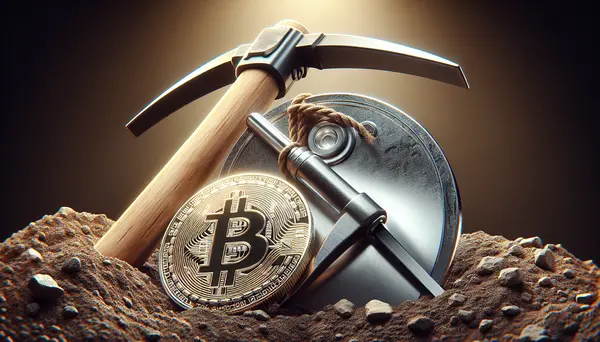Table of Contents:
Introduction to Bitcoin Mining Myths
As with any relatively new, technologically sophisticated concept, Bitcoin mining is susceptible to a plethora of myths and misconceptions. These unfounded narratives can create a fog of confusion, leading many to misjudge the true nature and prospects of this innovative endeavor. These misconceptions stem from a lack of understanding or biased perspectives. In this segment of the article, we will shed light on the reality of Bitcoin mining, dispelling common myths that have become entangled in public perception.
Understanding Bitcoin Mining
Before we can bust myths about Bitcoin mining, we must first grasp what it is. Bitcoin mining is a crucial part of the Bitcoin network's function. It involves the processing of Bitcoin transactions. Mining contributes to the network's security and reliability, allowing it to operate smoothly and efficiently. By competing with other miners and resolving complex mathematical problems, miners introduce new Bitcoins into the market. Understanding this basic concept enables us to dissect and debunk the prevalent myths associated with Bitcoin mining.
Get $500 free Bitcoin mining for a free testing phase:
- Real daily rewards
- 1 full month of testing
- No strings attached
If you choose to buy after testing, you can keep your mining rewards and receive up to 20% bonus on top.
Pro and Contra: Debunking Bitcoin Mining Myths
| Myths about Bitcoin Mining | Fact | Fiction |
|---|---|---|
| Bitcoin mining leads to massive energy consumption | Bitcoin mining does consume electricity but it encourages the use of renewable energy. | Bitcoin mining uses more power than some countries. |
| It's easy to profit from Bitcoin mining | Profiting from mining can be difficult as it requires extensive knowledge and resources. | Anyone can profit easily from bitcoin mining. |
| Bitcoin mining isn't ecologically sustainable | There are many sustainable mining operations that uses renewable energy resources. | All bitcoin mining operations leave a heavy ecological footprint. |
| Bitcoins are infinite | There's a finite number of Bitcoins that can ever be mined (21 million). | Bitcoins can be mined indefinitely. |
Common Myths about Bitcoin Mining

With its rising prominence, Bitcoin mining has become the subject of various misconceptions. Some people deem it inherently unfair, while others believe it's an easy path to quick riches. Some common myths include that it is only beneficial to technical experts, it's harmful to the environment, and that all Bitcoin miners are profit-driven. These myths often distort understanding and discourage many potential miners. Let's unpack these assertions to reveal the truth behind these myths.
Fact or Fiction? Unravelling Bitcoin Mining Misconceptions
The following section is dedicated to debunking some of the most common myths about Bitcoin mining. Our aim is to separate fact from fiction, offering clarity and understanding to those intrigued by this pioneering process.
One major misconception is that Bitcoin mining is only profitable in regions with low-cost electricity. This is not entirely accurate. While electricity cost is indeed a significant factor in the profitability equation, several other variables come into play. Technological efficiency, access to hardware, and the Bitcoin market price also have substantial influence over mining success.
Another fallacy often circulated is that Bitcoin mining is detrimental to the environment. Yes, it is true that Bitcoin mining requires substantial computational resources, contributing to electricity consumption. However, many miners are now utilizing renewable energy sources, thereby mitigating environmental impact. Furthermore, the relative energy utilization of Bitcoin mining is significantly smaller when compared to traditional banking systems and gold mining.
Lastly, the myth that Bitcoin mining is only for "tech wizards" is false. It is true that Bitcoin mining requires some technical knowledge, but it is not exclusive to experts in computing. With the right guidance and tools, even the less tech-savvy individuals can partake in Bitcoin mining.
Conclusion:

Like any emerging technology, Bitcoin mining is often surrounded by myths and misconceptions. However, upon a closer look, it is clear these assumptions are often based on half-truths and misinformation. By separating fact from fiction, we hope to shed new light on Bitcoin mining and dispel any unfounded myths.
Why are there Myths about Bitcoin Mining?
The phenomenon of myths about Bitcoin mining largely stems from a lack of awareness and understanding of what Bitcoin mining truly entails. As an inherently complex and technical process, Bitcoin mining can be daunting to those who aren't well-versed in the domain of cryptocurrency.
Moreover, it's quite common for nascent technologies, particularly those that disrupt traditional systems and norms, to be met with skepticism and misunderstanding. This is just what happened with Bitcoin mining. People naturally gravitate towards simplified narratives, which sometimes leads to the formation and propagation of myths.
Negative media portrayal can also contribute to the myth-making process. Sensational stories about Bitcoin mining being a magnet for illegal activities, for instance, have created a skewed view of mining activities, stirring unnecessary fear and uncertainty.
Finally, there's the evolving nature of Bitcoin mining itself. As mining becomes more sophisticated and professionalized, it's all too easy for outdated information to morph into prevailing myths. Thus, continuous learning and staying updated with developments in the Bitcoin mining ecosystem become essential.
Debunking the Top Bitcoin Mining Myths

By now, it's clear that Bitcoin mining is mildly misunderstood, leading to a number of myths, particularly around feasibility, profitability and environmental impacts. It's time to clear up these misunderstandings and provide you with the true picture of Bitcoin mining.
Myth 1: Bitcoin Mining is Only for The Technically Gifted
This is one of the most widespread misconceptions. While it's true that mining requires a level of technical understanding, it doesn't mean it's a realm reserved solely for the 'tech-savvy'. An abundance of user-friendly mining software and tools are available today, making it more accessible for individuals who lack technical expertise. Furthermore, step-by-step guides and tutorials on Bitcoin mining can help you grasp the process effectively.
Myth 2: Bitcoin Mining is a Get-Rich-Quick Scheme
Contrary to the notion held by some, Bitcoin mining is not an easy path to instant wealth. Like any line of work, it requires effort, time, and a substantial upfront investment, particularly to cover hardware and electricity costs. Also, the profitability of mining can vary based on several factors including the market price of Bitcoin, competition from other miners, and fluctuations in electricity pricing.
Myth 3: Bitcoin Mining Damages the Environment
While it's undeniable that Bitcoin mining uses electricity, it's not essentially the ecological villain it's often portrayed to be. A considerable proportion of miners use renewable energy sources, making mining far greener than many traditional industries. Additionally, technology improvements continue to make mining equipment more energy-efficient, cutting down on environmental impacts.
Myth 4: Mining is Not Worth It Because of Transaction Fees
The profitability of Bitcoin mining isn't merely dependent on transaction fees. More importantly, miners earn from the block reward, which may comprise newly minted Bitcoins and accumulated transaction fees. While transaction fees can provide additional earning, it's not the only income source for miners.
The key to debunking Bitcoin mining myths is understanding and education. As more people learn about blockchain technology and Bitcoin mining, these myths and misperceptions will gradually fade away, giving way to informed decisions based on facts and actual data.
The Truth about Bitcoin Mining Efficiency
An often-heard myth is that Bitcoin mining is incredibly inefficient and wasteful. In reality, the efficiency of Bitcoin mining operations vastly depends on the specific mining hardware in use, the local availability of cheap electricity, and overall market conditions. Technological advancements have led to the development of highly efficient mining hardware that significantly reduces the amount of power required per unit of computation.
Additionally, many Bitcoin mining operations are strategically located in regions where they can take advantage of cheap, renewable energy sources, such as hydroelectric or solar power. This further improves the efficiency of Bitcoin mining and reduces its environmental footprint.
While it's undeniable that Bitcoin mining consumes energy, it's important to put this into perspective. The reality is that traditional financial systems, with their millions of employees and physical infrastructure, consume vastly more resources than Bitcoin. Thus, when compared to the broad panorama of resource consumption in global finance, Bitcoin mining is far from being the wasteful and inefficient process that its often painted to be.
Is Bitcoin Mining Really Harmful to the Environment?
A regularly presented misbelief is that Bitcoin mining is causing severe damage to the planet due to the hefty energy consumption from computers running 24/7. To provide some perspective, the overall power usage of the Bitcoin network is purported to be more than some countries. While it's true that mining operations generally need enormous amounts of electricity, declaring it as inimical to the environment is simplifying a highly complex issue.
Firstly, it's essential to note that not all power is equal from an environmental standpoint. For instance, coal power is extensively detrimental, while solar and wind power are much friendlier to the environment. The geographic location of mining operations is a crucial component as it dictates the primary source of electricity and hence, its environmental impact.
Notably, a substantial amount of mining is performed in places with excess energy production, including areas rich in renewable energy sources. Therefore, while it's correct to say Bitcoin mining uses a lot of power, it's not necessarily accurate to claim as fact that it is entirely harmful to the environment.
Secondly, energy consumption is not exclusive to Bitcoin mining. Traditional banking systems, gold mining, data centers, and even our daily internet usage consume vast amounts of energy. When would we decide how much energy a particular industry is allowed to consume?
Lastly, we must also point out the developments in Bitcoin mining technology. Miners are continuously looking for ways to increase efficiency, thereby reducing energy use. It's, therefore, more constructive to focus on the innovation within the mining industry rather than being entangled in the energy consumption argument.
The Reality behind Bitcoin Mining’s Electricity Usage
One of the most pervasive myths about Bitcoin mining is that it consumes an exorbitant amount of electricity, leading to unnecessary environmental damage. It's true that Bitcoin mining requires substantial energy. However, context and relative comparisons are key to understanding this issue.
First, let's consider the energy usage of traditional financial sectors. According to some studies, these conventional industries consume far more electricity than the entire Bitcoin network. This traditional banking system operates around the clock, requiring constant power for physical branches, data centers, ATMs, and online banking services.
Next, an increasing number of Bitcoin miners are leveraging renewable energy sources to fuel their operations. This shift towards greener alternatives is in part pressured by the community and incentives for cheaper resources. Consequently, the negative environmental impact often associated with Bitcoin Mining is gradually being mitigated.
Moreover, the strategic location of mining rigs can also have a positive environmental effect. Mining farms are often set up in regions with an oversupply of electricity, thereby reducing waste. These rural or remote areas can export their surplus power, which would otherwise go unused.
In conclusion, while it's true that Bitcoin mining does use electricity, it is essential to recognize the efforts being made towards sustainable and efficient practices. Focusing on electricity usage alone misses the broader context and the innovations occurring within the Bitcoin mining industry to counteract this challenge.
Bitcoin Mining and Legality: Clearing Up Confusion
Another myth that causes significant confusion concerns the legality of Bitcoin mining. Many people mistakenly believe this process to be intrinsically illegal. This perception may be due to the use of cryptocurrencies in some illicit activities. However, it's essential to clarify that Bitcoin mining itself is not unlawful. Indeed, it is a legal enterprise in many countries worldwide.
The legality of Bitcoin mining varies from country to country, according to national laws. For instance, while countries like China have cracked down on Bitcoin mining, others such as the United States and Canada regard Bitcoin mining as legal and regulated activity.
Crypto mining follows tax laws and regulations like any other enterprise, and miners are required to declare their earnings for taxation purposes. Therefore, the assertion that all Bitcoin mining is an illicit activity is a clear myth. Remember, it is not the act of mining that may be illegal but rather how the output might be used.
Conclusion: Separating Bitcoin Mining Facts from Fiction
In conclusion, understanding the truth behind Bitcoin mining is essential to form an accurate perception of this revolutionary blockchain technology. While misconceptions are bound to arise in any emerging industry, it is paramount to separate the wheat from the chaff - the facts from the fiction.
We have debunked several prevalent myths - From deconstructing the misconception that Bitcoin mining is exclusively for tech-savvy individuals, to busting the myth that it is harmful for the environment, and dispelling the false notion that it is only profitable in cheap electricity regions.
Through this enlightenment, it becomes clear that Bitcoin mining, while complex, is accessible and viable more than ever before. While it does come with its set of challenges, the potential benefits make it a worthy consideration for those interested in contributing to the world of cryptocurrency. As we segue into the future, let's base our perception of Bitcoin mining on facts, not fiction.
Unraveling The Reality: Debunking Bitcoin Mining Myths
Is Bitcoin mining illegal?
No, Bitcoin mining is not illegal. However, legality can vary by country as some nations have banned or restricted Bitcoin.
Does Bitcoin mining harm the environment?
Though Bitcoin mining does consume electricity, its environmental impact is often overemphasized. Innovations in renewable energy can mitigate these effects.
Can anyone do Bitcoin mining?
Yes, anyone with the necessary hardware and access to the internet can mine for Bitcoin. However, the profitability of mining has decreased due to increasing difficulty and competition.
Is Bitcoin mining just creating new Bitcoins?
No, Bitcoin mining has two purposes: creating new Bitcoins and verifying & adding transactions to the blockchain.
Will mining end when all Bitcoins are mined?
No, even after all Bitcoins are mined, miners will still verify and add transactions to the blockchain and will be paid transaction fees instead of new Bitcoins.






